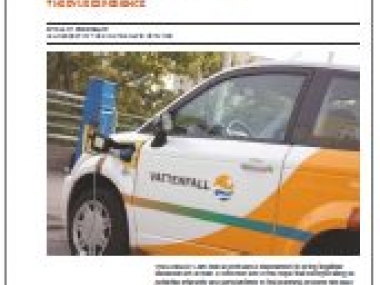Private partners in electric mobility: The EVUE experience
Edited on
09 October 2017The URBACT project Electric Vehicles in Urban Europe focuses on the development of integrated, sustainable strategies and dynamic leadership techniques for cities to promote the use of electric vehicles. EVUE's URBACT Local Support Groups (ULSG) provide the opportunity for the partner cities to work with private partners. Sally Kneeshaw, Lead Expert for EVUE, tackles this issue of joint working with private sector companies in her article "![]() Download Private Sector Partners in Electric Mobility The Evue experience Thematic Paper (191.64 KB)".
Download Private Sector Partners in Electric Mobility The Evue experience Thematic Paper (191.64 KB)".

Unlocking potential
From Sally Kneeshaw's point of view it is clear that joint working with private sector companies is the most efficient way to unlock the greening potential of electric vehicles in European cities.
But how can this be achieved? How can we best understand the perspectives of each stakeholder and create structures to attract and sustain the active participation of potential industry partners and investors?
A survey of stakeholders in EVUE Local Support Groups showed that the great majority of them have private sector partners, mostly from utility companies, carmakers, infrastructure providers, car clubs, small business networks and consultancies.
Sally Kneeshaw points out that it has not been difficult to engage these partners. They have a commercial interest in the rollout of electro-mobility. They see opportunities, and need to work with public authorities to get into supply chains and influence how strategies are delivered.
The author presents in her article reports from city administrations and private sector partners about the benefits and challenges of working together.
An example: Clean vehicle collaboration
For Eva Sunnerstedt, Head of the Clean Vehicles Team in the City of Stockholm, many years of experience have led to good collaboration: "We actually have engaged with the private sector quite often on the issue of biogas (methane) as a fuel for vehicles. In order for it to be successful everyone has to see the need to act together and the benefit this can bring. It is important that all stakeholders take the time to listen to each other and that good suggestions or decisions are actually achieved or carried forward – otherwise the forum will stop".
Stockholm is selective with its private sector partners. Eva says: "When we prepared for the Local Action Plan we interviewed almost every organisation in Stockholm and Sweden that had demonstrated any interest in Electric Vehicules. The ones that showed great interest in Stockholm were the ones we invited to the LSG".
Private sector involvement
So how does it feel on the other side of the table? What do the private sector partners think about this cooperation with cities?
Andrzej Szyp defines it as an injection of energy. Andrzej is E-mobility Project Manager in Vattenfall Distribution Poland S.A., Vattenfall's representative in the Local Support Group for the City of Katowice in the EVUE project.
Vattenfall is one of Europe's largest generators of electricity and the largest producer of heat. It is committed to making electricity production cleaner and to seeing this contribute to sustainable transport.
Andrzej says: "In our opinion cooperation is the key success factor in making progress towards sustainable urban transport and electric mobility. We would like to act as the e-mobility enabler. If we see cities working in a holistic way in order to develop their approach and strategies – we would like to be a part of it and support such activities."
Andrzej's advice for URBACT Local Support Groups is to develop a close and honest cooperation between the partners, sharing not only the best practices and successes but also mistakes and lessons to be learned.
As for the benefits to his company, Andrzej adds: "the process of developing the e-mobility market has a number of stakeholders of existing and future industries. All the parties can gain more than they otherwise would have gained – it can be the win-to-win scenario".
And on a personal level - "my participation in EVUE transnational meetings gave me the most extraordinary and exciting opportunity to meet and work with very knowledgeable and experienced experts."
Sustainable Success
According to Sally Kneeshaw, clearly the motivations and cultures of public and private sector stakeholders are different, and part of the challenge is to accommodate these differences.
The benefits reported by private sector stakeholders are improved market intelligence, profile, relationship building with potential customers and ultimately winning contracts. For cities the benefits include the investment and technical expertise brought by business to achieve urban policy.
This convergence of interests around electric vehicle strategies can be used as a binding force to create real long term partnerships to get more green cars on the ground in cities. The insights described here confirm the need for URBACT type dialogue and action planning at both city and European level.
Read more:
- EVUE - URBACT website
 Download Private Sector Partners in Electric Mobility The Evue experience Thematic Paper (191.64 KB) - PDF
Download Private Sector Partners in Electric Mobility The Evue experience Thematic Paper (191.64 KB) - PDF
Submitted by admin on




